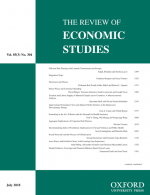
Heiner Schumacher, Iris Kesternich, Michael Kosfeld,
Joachim Winter, 2017,
Review of Economic Studies, 84 (3), 1346–1377
Joachim Winter, 2017,
Review of Economic Studies, 84 (3), 1346–1377
Abstract:
We experimentally analyse distributional preferences when a decider chooses the provision of a good that benefits herself or a receiver, and creates costs for a group of payers. The treatment variation is the number of payers. We observe that subjects provide the good even if there are many payers so that the costs of provision exceed the benefits by far. This result holds regardless of whether the provision increases the decider’s payoff or not. Intriguingly, it is not only selfish or maximin types who provide the good. Rather, we show that a substantial fraction of subjects are “insensitive to group size”: they reveal to care about the payoff of all parties, but attach the same weight to small and large groups so that they ignore large provision costs that are dispersed among many payers. Our results have important consequences for the approval of policies with concentrated benefits and large, dispersed cost, as well as the analysis of ethical behaviour, medical decision-making, and charity donations.
We experimentally analyse distributional preferences when a decider chooses the provision of a good that benefits herself or a receiver, and creates costs for a group of payers. The treatment variation is the number of payers. We observe that subjects provide the good even if there are many payers so that the costs of provision exceed the benefits by far. This result holds regardless of whether the provision increases the decider’s payoff or not. Intriguingly, it is not only selfish or maximin types who provide the good. Rather, we show that a substantial fraction of subjects are “insensitive to group size”: they reveal to care about the payoff of all parties, but attach the same weight to small and large groups so that they ignore large provision costs that are dispersed among many payers. Our results have important consequences for the approval of policies with concentrated benefits and large, dispersed cost, as well as the analysis of ethical behaviour, medical decision-making, and charity donations.

